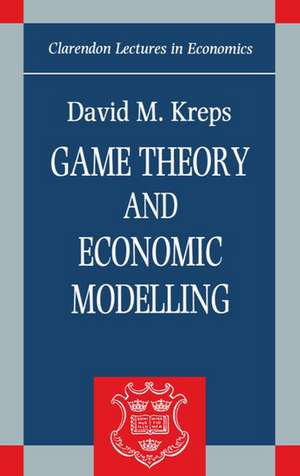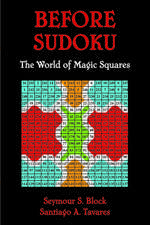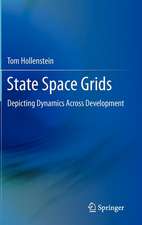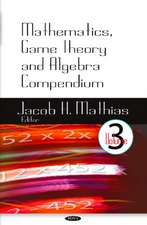Game Theory and Economic Modelling: Clarendon Lectures in Economics
Autor David M. Krepsen Limba Engleză Paperback – 4 oct 1990
Preț: 324.25 lei
Preț vechi: 377.31 lei
-14% Nou
Puncte Express: 486
Preț estimativ în valută:
62.04€ • 64.78$ • 51.35£
62.04€ • 64.78$ • 51.35£
Carte tipărită la comandă
Livrare economică 24-31 martie
Preluare comenzi: 021 569.72.76
Specificații
ISBN-13: 9780198283812
ISBN-10: 0198283814
Pagini: 204
Ilustrații: 40 line figures
Dimensiuni: 139 x 217 x 16 mm
Greutate: 0.27 kg
Ediția:Revised
Editura: OUP OXFORD
Colecția OUP Oxford
Seria Clarendon Lectures in Economics
Locul publicării:Oxford, United Kingdom
ISBN-10: 0198283814
Pagini: 204
Ilustrații: 40 line figures
Dimensiuni: 139 x 217 x 16 mm
Greutate: 0.27 kg
Ediția:Revised
Editura: OUP OXFORD
Colecția OUP Oxford
Seria Clarendon Lectures in Economics
Locul publicării:Oxford, United Kingdom
Recenzii
`fascinating little book' Jean Tirole, Journal of Economic Literature
`a book I could not put down ... the exposition is remarkably clear' Journal of Economic Perspectives
`Will rapidly be established as a basic reference for students and their teachers ... even the less mathematically inclined economists will find much to gain from the application of new game theory techniques in economics.' Scottish Journal of Political Economy
'It is partly a measure of how much macroeconomics has ceased to be a separate subject from microeconomics that workers in my field will now find so much to interest them in this book. It is more a measure of how engaging this book is.'Thomas J. Sargent, University of Chicago, Journal of Political Economy
'The writing is in a very personalised style. Though the book is putatively for the novice, or less formally trained reader, the presentation and the level of the debate does make certain demands. It nevertheless is frontline stuff.'Economics Times, April 1992
'I view Krep's discussions in the book as both interesting and helpful in describing certain key weaknesses of standard game theory.'Ronald Heiner, George Mason University, Constitutional Political Economy, Vol. 3, No. 1, 1992
'Kreps has written a book that makes a sincere attempt to demystify game theory for the uninitiated and set the stage for a serious appraisal of the scope and limitations of game theory ... it does manage to convey a flavour of the excitement that comes from grappling with strategic behaviour, and hopefully should convince the reader with an open mind that game theoretic questions and applications are abstractions of relevant economic issues.'Anindya Sen, Economic and Political Weekly, Vol XXVII No 14 April 4, 1992
`a book I could not put down ... the exposition is remarkably clear' Journal of Economic Perspectives
`Will rapidly be established as a basic reference for students and their teachers ... even the less mathematically inclined economists will find much to gain from the application of new game theory techniques in economics.' Scottish Journal of Political Economy
'It is partly a measure of how much macroeconomics has ceased to be a separate subject from microeconomics that workers in my field will now find so much to interest them in this book. It is more a measure of how engaging this book is.'Thomas J. Sargent, University of Chicago, Journal of Political Economy
'The writing is in a very personalised style. Though the book is putatively for the novice, or less formally trained reader, the presentation and the level of the debate does make certain demands. It nevertheless is frontline stuff.'Economics Times, April 1992
'I view Krep's discussions in the book as both interesting and helpful in describing certain key weaknesses of standard game theory.'Ronald Heiner, George Mason University, Constitutional Political Economy, Vol. 3, No. 1, 1992
'Kreps has written a book that makes a sincere attempt to demystify game theory for the uninitiated and set the stage for a serious appraisal of the scope and limitations of game theory ... it does manage to convey a flavour of the excitement that comes from grappling with strategic behaviour, and hopefully should convince the reader with an open mind that game theoretic questions and applications are abstractions of relevant economic issues.'Anindya Sen, Economic and Political Weekly, Vol XXVII No 14 April 4, 1992























